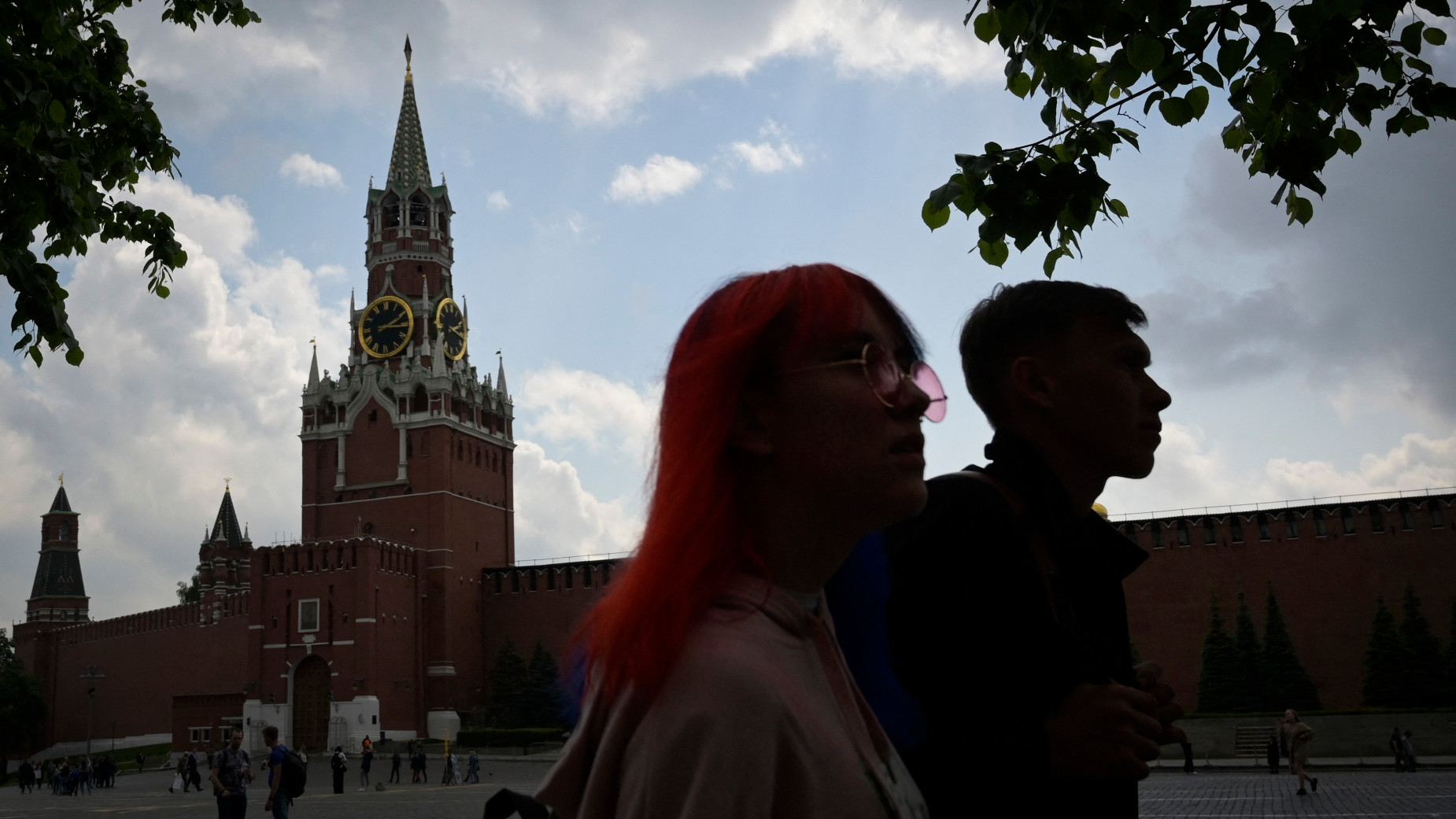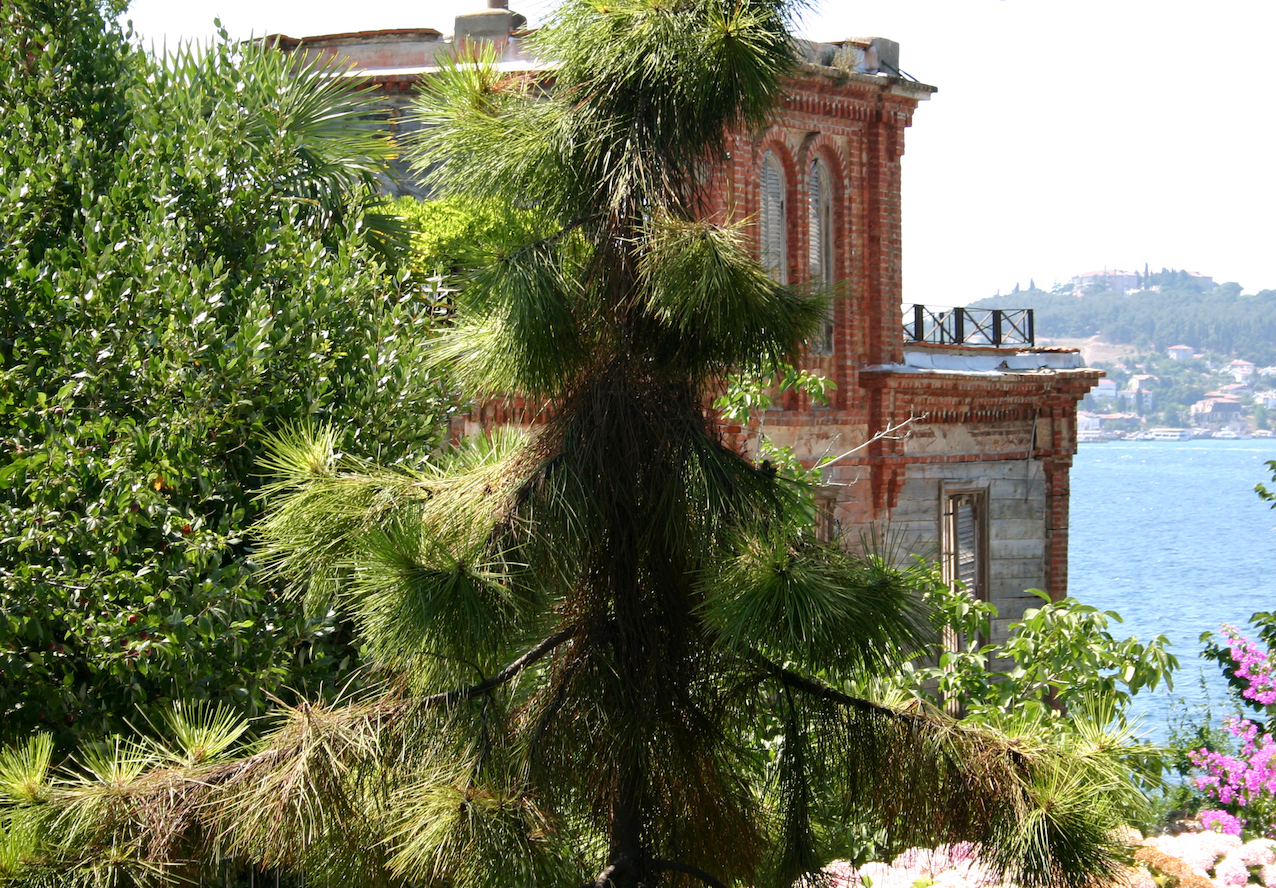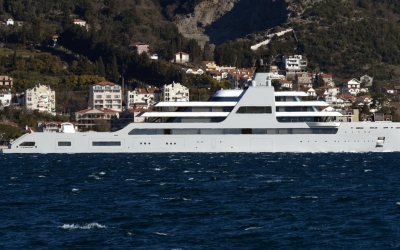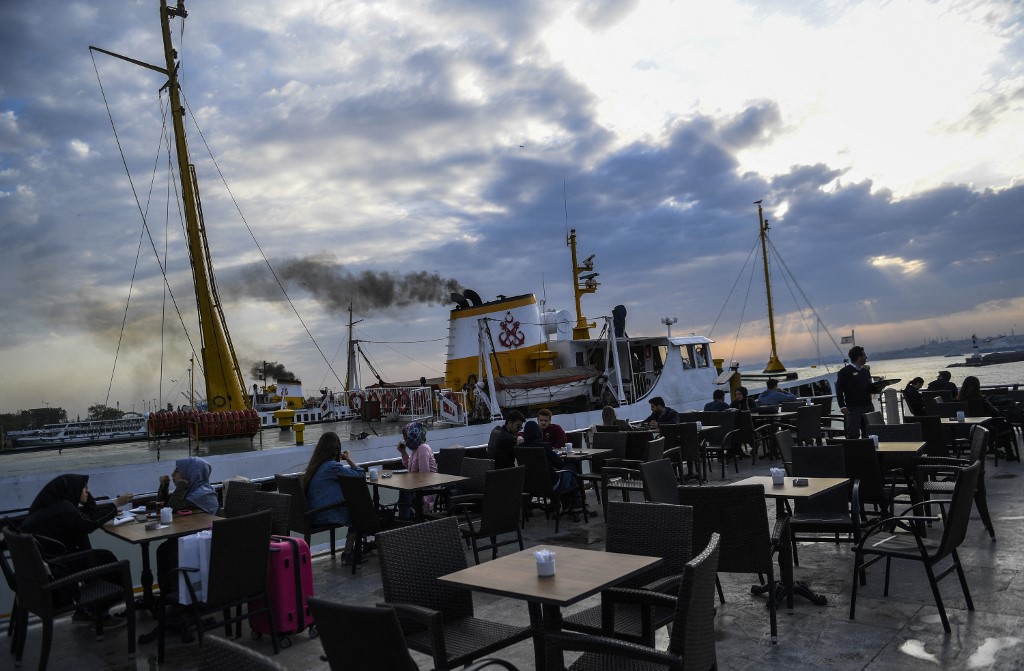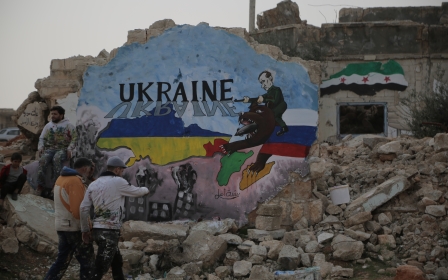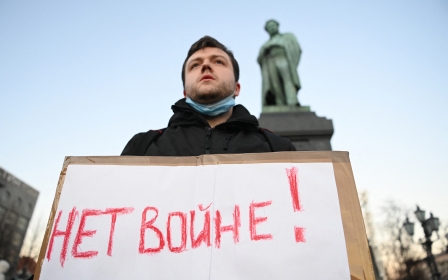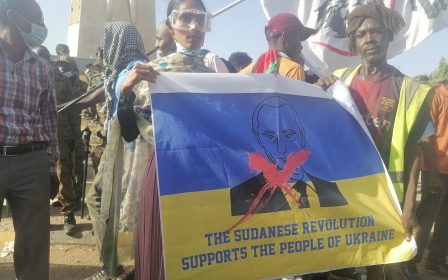Ukraine war: Russian exiles in the Middle East look back on a world in ruins

On the morning of 24 February, Artur woke up in his Moscow flat and opened up Slack on his computer, the messaging platform used by the cultural institution he worked for. It was early, but a colleague had already been in touch. The unthinkable had happened: Russia had invaded its neighbour Ukraine.
“I felt sick to my stomach,” Artur, who is from Siberia, told Middle East Eye. “I never felt so shocked. When you wake up to a reality so twisted - I couldn't believe it. Ukraine of all places, it feels like attacking your family.”
Artur, who is in his 30s, had been in Moscow for years. He is open about the fact that he lived in a “bubble”, an ecosystem of journalists, architects, artists, tech people and other young professionals who felt that, despite Vladimir Putin and the Russian establishment, they were part of the wider world.
“It's beyond sad,” he said. “This bubble was also a vision of an alternative Russia that existed in parallel with Putin's Russia. My hopes were generational. I thought things would change when the old Soviet generation was not in power anymore.”
'This bubble was also a vision of an alternative Russia that existed in parallel with Putin's Russia'
- Artur, Russian exile in Istanbul
Back in Siberia, Artur's family and many of his classmates, who are scared and who also oppose the war, told him to leave. He is single and does not have a family. He can speak English. For many back in Siberia, leaving was impossible - either they didn't have the money, or they were too rooted to their communities. For Artur, escape was possible.
The cultural institution he works for ceased its operations. On 4 March, as rumours that the government was set to impose martial law swept across Russia, Artur packed up his things, bought a 30,000 rouble air ticket from Moscow to Istanbul on a “dodgy Russian website” and made his way alone to Domodedovo airport.
The day before, Yura, an independent journalist in his early 30s, awoke in the Russian capital to reports that the army was shelling Ukraine’s Zaporizhzhia nuclear plant, as more and more international companies were suspending their operations inside Russia.
For four hours, he joined tens of thousands of Russians searching for a one-way ticket to Istanbul. Finally, he found a plane flying to Turkey via Bishkek, the capital of Kyrgyzstan. “I paid around 400 euros for the ticket. Usually, even a direct flight costs less than 100 euros,” he told MEE.
Yura, who grew up in modest circumstances in the southwest Russian city of Kazan, “cleaned up” his mobile phone, deleting anything that could lead border guards to detain him. “Police ask you to give up your mobile phone, they check everything through searching keywords, like Putin, Ukraine, etc. But you can’t delete everything as it would increase suspicion, too,” he said.
Like Yura, Artur had heard stories of people being interrogated at the border, of having their phones checked and being stopped from leaving. He had gone through his device the night before leaving, removing everything.
He was surprised to find Domodedovo airport virtually empty. Artur’s friends had told him that was the case with other airports, though it is now thought that upwards of 250,000 people have left Russia in the wake of the war.
Artur passed through border control and onto the plane without any trouble.
Destination lottery
Artur chose Istanbul because he knew the city and liked it. There are historical echoes in the Turkish metropolis for Russians in exile. “In some very strange way you can't help but notice the similarities to when the White Russians fled the country to Istanbul after their defeat by the Bolsheviks,” Artur told MEE.
Russians can enter Turkey on a tourist visa. For work and residency permits, they have to apply to the country's immigration office.
Istanbul has seen a massive influx of Russians and Ukrainians - some of whom are Turks returning to their country from Ukraine - since the war began. Some wealthier Russians have headed to Dubai, with Emirates airlines continuing to fly regularly and diplomatic relations between the UAE and Moscow on a sure footing.
'Turks, unlike Europeans, don’t overlook Russians. Here we’re received equally'
- Vsevolod, Ukrainian-Russian artist
Ivan, who moved to the emirate on a three-year visa before the war for his work in virtual and augmented reality, told MEE there were already hundreds of Russians in Dubai and that they had set up a Telegram group to help the new arrivals with apartments, bank accounts and other practical necessities.
Russians new to Dubai can stay on a 90-day visa while they look for something more permanent
Irina, from the Georgian breakaway region of Abkhazia, said she had flown to Dubai from Moscow and stayed there for four days with her British boyfriend, who had come out from London to meet her. The couple then returned to the UK. Irina had been protesting in Moscow just a week before, but said the police presence on the streets had become unbearable.
Artur had friends who were going to Georgia or Armenia, the preferred destinations for those with less money leaving Russia, but he felt that neither the Georgian capital Tbilisi or the Armenian capital Yerevan had the capacity to absorb the number of Russians heading their way. It is thought that 30,000 Russians have headed to Tbilisi, and there is some anti-Russian sentiment in the city. The ancient and vast city of Istanbul was somewhere he could disappear into.
Trotsky's refuge
For the most part, Russians have been using Airbnb to find places in Istanbul. As a result, the prices of flats in the city's central neighbourhoods have shot up. Kadikoy and Karakoy are the Istanbul areas where most Russians are staying, frequenting Leman Cafe, Papadopoulos Cafe and Solera Winery.
Exiles are also heading to the seaside town of Kas, which has an existing Russian population. The arrival of thousands more in this small holiday destination in Turkey’s southwest has propelled property rental prices, and MEE has heard reports of unrest.
When Artur arrived in Istanbul, he headed for the Princes' Islands, where Leon Trotsky lived for four years from 1929 following his exile from the Soviet Union. Having visited the city a few times before, he knew that acccommodation on the islands in the Sea of Marmara would be cheaper, as despite the fact that the ferry ride to the city is short, many Russians in Istanbul are not aware of this, so property prices have not jumped with an increase in demand.
On the European side of Istanbul, in Karakoy, Vsevolod sat on a creaking chair in an old Greek apartment a few hundred metres from the Aya Pandeleimon Church, founded by Russian exiles who came to Istanbul after the 1917 revolution. Just as they did, the artist in his mid-30s is having to find a place for himself in Karakoy.
Originally from Ukraine’s Donetsk, which was occupied by Russia in 2014, Vsevolod, who holds Ukrainian and Russian passports, is no stranger to feelings of hatred towards the Kremlin. “Putin stole my childhood, my memories, my summer,” he said, remembering long days with his grandmother back in Donetsk.
“It has become an existential threat to live in Russia. Istanbul is a nice city with a lot of museums. I have friends here,” Vsevolod told MEE, adding that he also lived in a bubble back in Russia. “Besides, Turks, unlike Europeans, don’t overlook Russians. Here we’re received equally.”
While Turks are mostly welcoming Russians, a series of logistical nightmares await those fleeing Putin’s Russia.
When Artur arrived, it was snowing, and he couldn't leave the islands Trotsky once lived on. Russian bank accounts are blocked and he could not use his bank card.
Like other Russians who have left the country, Artur has had to find clever ways to access cash. He transferred a sum of money from his Russian account to a friend's mother, also in Russia. The friend lives in Portugal, and was able to send Artur the same amount in cash via Western Union.
MEE has heard that other Russians are using cryptocurrency to get their money out of Russia. The Telegram group for Russians in Dubai includes instructions from tech professionals on how best to put your money into cryptocurrency.
The Turkish currency crisis has also bought Russians a little time, as prices are lower than normal.
While Artur never used the Russian Mir bank card before (“Mir” means “peace”), he realised that the card could be used in Turkey, and so has applied for one. The day before he spoke to MEE in Istanbul, he spent the whole day with a friend at a Turkish bank, setting up a bank account, which they managed to do. Vsevolod was having less luck. “I can’t withdraw money and I need to find an apartment as soon as possible,” the artist said.
Artur says he is aware of his privilege, and although as an employee in the creative industries, his livelihood has always felt precarious, he adds, “my thoughts are with those in a much more dire situation”.
For the most part, he means Ukrainians. He characterises the Russians who have been able to leave the country as “very educated, very middle-class, IT, journalists, architects, people who could afford to get expensive tickets. People who are quite young, usually in their 30s.” Mostly these people do not have families, but some Russians have left the country with their children.
While Artur says his family back in Siberia are against the war, he knows that plenty of Russians aren't. He doesn't want to make any pronouncements on how his countrymen think, but he says that over the years Vladimir Putin has built up a “system of oppression” that has seen a lot of money funnelled to the police and army, which makes those institutions very loyal to the Russian president.
“Now, it’s worse. You see the Z sign everywhere,” Yura says, referring to the now pro-invasion symbol. “In normal times, it’s better to change direction when you see a policeman on the street. Now, plainclothes police or FSB [Russia’s security agency] agents approach people in the streets to check their phones.”
Recalling a dispute he had with a friend from Georgia, Yura, who is partly Georgian himself, said of Europeans and others outside Russia: “They want us to go out onto the streets, to speak up, to organise protests. They live in countries where people don’t disappear for joining protests. But I do live in such a country, where the FSB would detain you or even your relatives for countering state policies.”
For years, Artur, like most of the other Russians MEE spoke to for this story, was part of a community in Moscow that looked out to the world. Like the younger Russians he admired, this scene was “free thinking, open minded, queer - that gave me hope”. This was a cool Moscow, a place where something was always happening. But it was, as Artur says, a bubble.
“I'm still in shock,” he says. “I have no idea what is going to happen. It's all in ruins. That image of a different Russia: it's gone.”
This article is available in French on Middle East Eye French edition.
Middle East Eye propose une couverture et une analyse indépendantes et incomparables du Moyen-Orient, de l’Afrique du Nord et d’autres régions du monde. Pour en savoir plus sur la reprise de ce contenu et les frais qui s’appliquent, veuillez remplir ce formulaire [en anglais]. Pour en savoir plus sur MEE, cliquez ici [en anglais].


